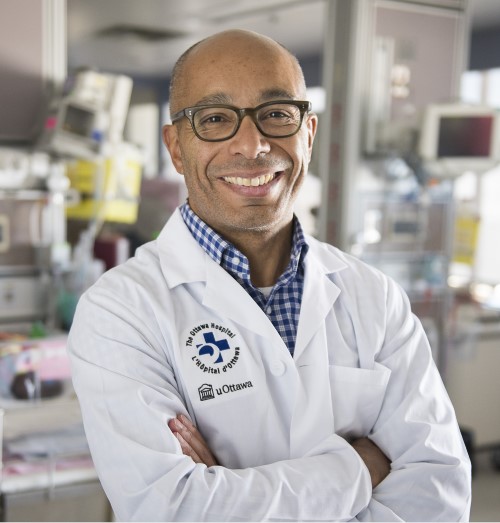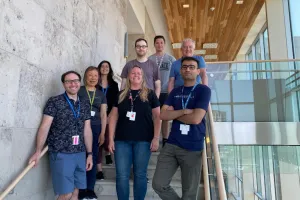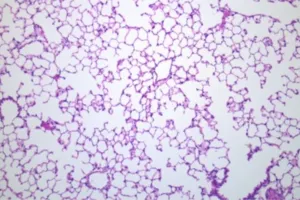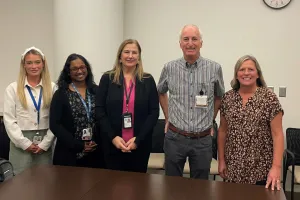Huge hope for our smallest patients
 "We really need another breakthrough for premature babies. I hope my research will contribute to that." -Dr. Bernard ThébaudDr. Bernard Thébaud clearly remembers the day he decided to become a doctor--his dad had suggested the soccer-loving teen become a sports physician. But from the first day of his pediatric surgery rotation, Dr. Thébaud knew he wanted to help the hospital's youngest patients.
"We really need another breakthrough for premature babies. I hope my research will contribute to that." -Dr. Bernard ThébaudDr. Bernard Thébaud clearly remembers the day he decided to become a doctor--his dad had suggested the soccer-loving teen become a sports physician. But from the first day of his pediatric surgery rotation, Dr. Thébaud knew he wanted to help the hospital's youngest patients.
"I had great teachers who taught me about the beauty of newborn care -- about not just accepting the status quo and applying protocols, but thinking every day about how you can improve things and make them a little bit better," he remembers. "Later on, I discovered you could actually answer some of the big questions by doing research in the lab, so that's what I decided to do."
Born and raised in Munich, Germany, Dr. Thébaud studied medicine in Strasbourg and pediatrics in Paris, ultimately starting his research career at the University of Alberta after completing a postdoctoral fellowship there. In 2012, The Ottawa Hospital recruited him to its Regenerative Medicine Program to accelerate research on cell-based therapies for lung diseases.
Very premature babies need more options
One disease Dr. Thébaud sees regularly in his patients at The Ottawa Hospital and CHEO is bronchopulmonary dysplasia (BPD), the most common complication for very premature babies. This chronic lung disease is caused by the breathing equipment and extra oxygen that keeps very premature babies alive, but also damages their delicate lungs. Because their growing brains get less oxygen, babies with BPD may go on to have learning disabilities, or problems walking, hearing and seeing.
"The resilience of these babies is inspiring," says Dr. Thébaud. "Their lungs are so immature, and yet they still succeed in breathing -- yes, with our help, but they have the potential; we're just supporting them with what they need."
There is no cure for BPD, but Dr. Thébaud and his team hope to change that. In the lab, they found that cells from the umbilical cord, called mesenchymal stromal cells or MSCs, could prevent BPD in newborn rodents.
A discovery with game-changing potential
Now, their ground-breaking study published in the American Journal of Respiratory and Critical Care Medicine shows that tiny particles released by these MSCs, called extra-cellular vesicles (EVs), are just as good at preventing BPD.
These "nanotherapies for micropreemies" have similar effects to MSCs but are easier to manufacture, store, and dose. Unlike MSCs, they can cross the blood-brain barrier, meaning they can travel into the brain after being injected into the blood stream.
In this study, Dr. Thébaud and his team showed for the first time that BDP also impairs some of the key functions of brain stem cells. These stem cells play an important role in brain development. Importantly, the researchers found MSC-EVs treatment could prevent this brain injury as well as lung injury in newborn rodents with BPD.
These novel findings support testing MSC-EVs as a possible therapy for protecting premature infants from the devastating effects of this chronic lung disease.
"If this therapy can improve the brain and lung health of babies born too soon, it will be a game-changer," says Dr. Thébaud.
This study comes as Dr. Thébaud prepares to launch a phase I clinical trial to test the feasibility and safety of using MSCs to treat premature babies with BPD. He hopes to evaluate the MSC-EV therapy in future trials.
"We're at a point where we really need another breakthrough for premature babies," he says." I hope my research will contribute to that."
Dr. Thébaud is a neonatologist and senior scientist in The Ottawa Hospital's the Regenerative Medicine Program, which includes the Sinclair Centre for Regenerative Medicine and the Sprott Centre for Stem Cell Research. He is also neonatologist and senior scientist at CHEO and holds the uOttawa Partnership Research Chair in Regenerative Medicine. Check out this Q&A and podcast to learn more about what inspires him.
Learn more about:
The Ottawa Hospital is a leading academic health, research and learning hospital proudly affiliated with the University of Ottawa and supported by The Ottawa Hospital Foundation.


